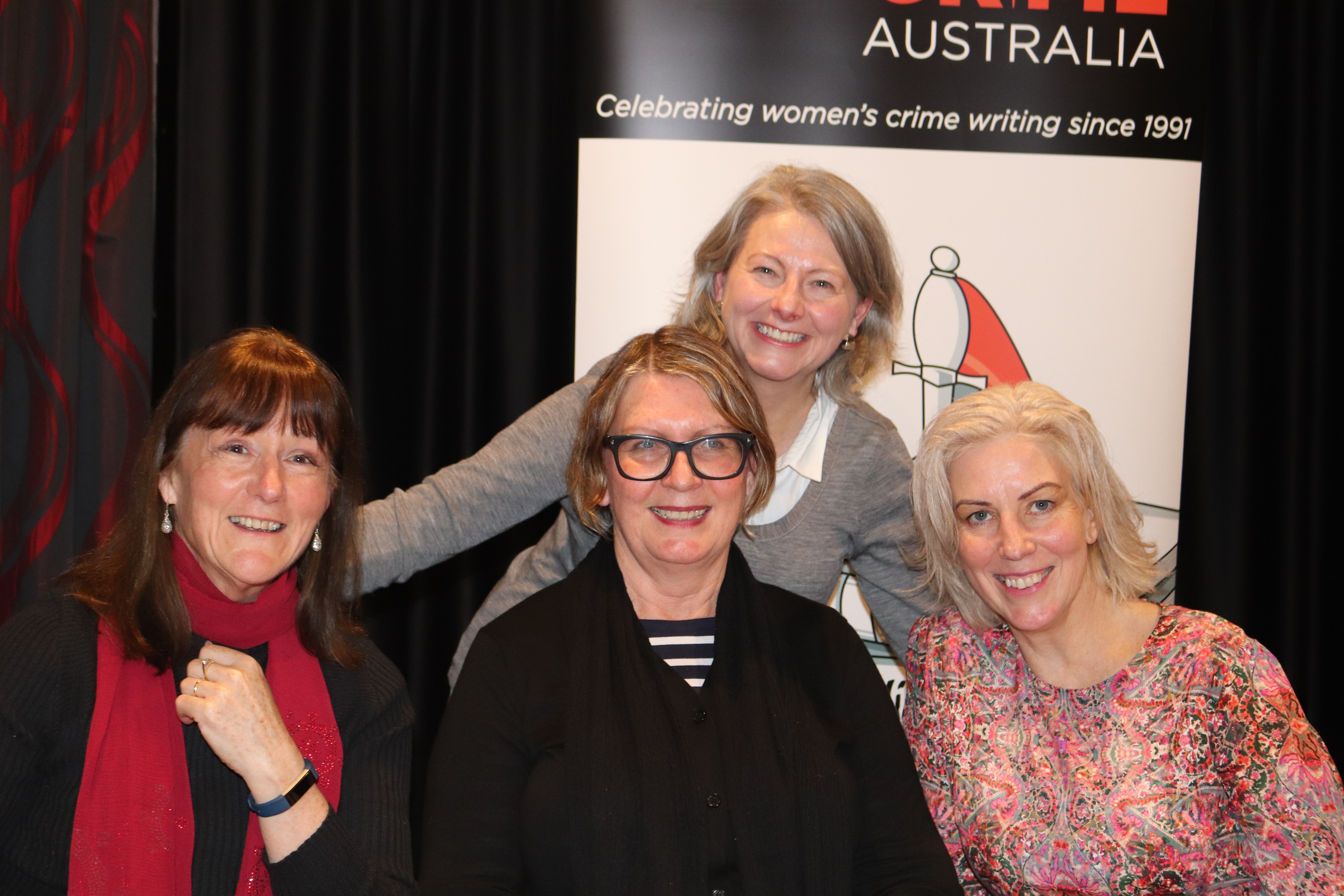Sisters in Crime events have had many weird and wonderful titles over the past three 28 years but never one so engaging and amusing as “Deadbeat Brothers and the trouble they cause,” which was conceived by Robyn Walton, Sisters in Crime’s Vice-President.
By amazing coincidence the protagonists in three new crime books by JM Green, Carmel Reilly and Sherryl Clark are all women who have to clean up messes created by their deadbeat brothers.
On 26 July the authors confided all to compere Tony Jordan and an enthusiastic bunch of crime aficionados how they all enjoyed the challenges of creating a fictional family – and all those deadbeat brothers.
J M Green’s most recent book is Shoot Through (Scribe Publications), the last in her trilogy featuring Stella Hardy, the wisecracking social worker in Melbourne West.
 Difficult families are “absolute narrative gold”, according to Jen.
Difficult families are “absolute narrative gold”, according to Jen.
“If there are challenges, they are worth it. There are so many great reasons to have a character who is a foil or even as antagonist, and who happens to be related to your protagonist. For one thing, they are very hard to get rid of. They’re family. Blood is thicker than water and things have to be pretty bad between you before you can cut them off.
“And if you do tell your deadbeat brother to bugger off, your mum (or other relative) is likely to have words with you. They are perfect at being a big pain in the arse. I loved having a deadbeat brother who is the worst, just so terrible, and if he wasn’t related Stella would’ve had nothing to do with him. Ben has a reason to hang around – usually he wants to borrow money or some favour – and he’s is very hard for Stella to ignore. Families in fiction are great, I reckon, and the more difficult the better.”
 Sherryl Clark’s novel, Trust Me, I’m Dead ,was shortlisted for the CWA (UK) Debut Dagger 2018 and has been published by Verve, UK, as part of a two-book deal. She says:
Sherryl Clark’s novel, Trust Me, I’m Dead ,was shortlisted for the CWA (UK) Debut Dagger 2018 and has been published by Verve, UK, as part of a two-book deal. She says:
“Every fictional family is a joy and a nightmare – to create, that is! Every member of the family needs a backstory, a history of who they have been and why, and who they are inside their family. As we know from personal experience, a single big event or disaster in a family can be remembered and reinterpreted differently by every single person involved (and then there’s the gossip from those who weren’t involved). Of course, this makes great material for a story, and when murder is involved, families add multiple layers and nuances and plot twists. The challenge is keeping track of them all.
“I’ve discovered my most productive time for this ‘family wrangling is when I wake up in the morning and am procrastinating on getting out of bed. I mull over my characters and their actions/reactions, their stories and what they think is happening, what I think is happening, and this is very often when I spot plot holes and inconsistencies. Then it’s ‘up and at ’em’ to get back to the manuscript, or make notes, so I don’t forget.
 Carmel Reilly is one of Australia’s busiest educational writers, with over 300 titles to her name. Life Before (Allen & Unwin) is her debut crime novel.
Carmel Reilly is one of Australia’s busiest educational writers, with over 300 titles to her name. Life Before (Allen & Unwin) is her debut crime novel.
“Writing a story is like juggling a whole lot of different sized balls at once. You’re not only telling the story but you’re setting the scene, developing the characters and inserting them into relationships that are frequently fraught. For me, stories are always character driven—I’m always thinking about how a character will react in a particular situation?
“Exploring a family might just involve a higher level of intensity between characters: the imaging of deep bonds or resentments; the expectations and the disappointments that come with life-long relationships. And of course, there’s the added ‘blood’s thicker than water’ adage. While we might be able to slough off some people in our lives, it’s a lot harder to do with family. Family (for the most part) are—both literally and metaphorically—part of our DNA. They are always with us in some way or other.
“Tolstoy’s happy/unhappy dichotomy seems to haunt a good deal of writing about families. It tells us that there are only two kinds of families and that only one of those has any level of complexity, or even interest, when it comes to storytelling. Personally, I’m not so black and white on the issue. The way I see it is that all families have their fault lines, whether they crack wide open or not depends a great deal on how and where you put the pressure.
“The family I created in my novel, Life Before, was in many ways a happy family: contented enough, stable enough. Yet a series of unfortunate events—some deliberate, some not—served to illustrate that no one is immune from the cruel hand of fate, or perhaps the vengeful unhappiness of others. Just because you were happy once doesn’t mean you’ll always be happy. Nor, thankfully, does it mean that you’ll never have the possibility of happiness again.”
